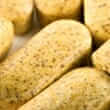Background
- L-glutamine is a nonessential amino acid (i.e., the human body can synthesize it) found mainly in skeletal muscle. Glutamine plays an important role in many functions of the body, including acid-base balance, nitrogen supply, and formation of DNA, protein, and other nutrients. A typical dietary intake is 5-10 grams daily, coming from common dietary animal and plant protein sources. In certain situations, such as in severe illness or trauma, the body may require higher levels of glutamine. Glutamine has been commonly studied in postsurgical, trauma, critically ill, burn, very-low-birthweight, and transplant patients, as well as for reducing side effects of chemotherapy, radiation therapy, and HIV medications. Glutamine is also commonly used to improve general immune system health and for exercise performance enhancement.
- Some well-designed studies support the use of glutamine as part of parenteral nutrition (nutrition delivered by injection into a vein or muscle) in postsurgical, burn, or ill patients. Further research in patients with malnutrition, digestive concerns, or other illnesses is needed.
References
- Berard MP, Zazzo JF, Condat P, et al. Total parenteral nutrition enriched with arginine and glutamate generates glutamine and limits protein catabolism in surgical patients hospitalized in intensive care units. Crit Care Med 2000;28(11):3637-3644. View Abstract
- Blijlevens NM, Donnelly JP, Naber AH, et al. A randomised, double-blinded, placebo-controlled, pilot study of parenteral glutamine for allogeneic stem cell transplant patients. Support Care Cancer 2005;13(10):790-796. View Abstract
- Byrne TA, Wilmore DW, Iyer K,et al. Growth hormone, glutamine, and an optimal diet reduces parenteral nutrition in patients with short bowel syndrome: a prospective, randomized, placebo-controlled, double-blind clinical trial. Ann Surg 2005;242(5):655-661. View Abstract
- Escolar DM, Buyse G, Henricson E, et al. CINRG randomized controlled trial of creatine and glutamine in Duchenne muscular dystrophy. Ann Neurol 2005;58(1):151-155. View Abstract
- Garre D, Patenaude J, Nedelec B, et al. Decreased mortality and infectious morbidity in adult burn patients given enteral glutamine supplements: a prospective, controlled, randomized clinical trial. Crit Care Med 2003;31(10):2444-2449. View Abstract
- Giris M, Erbil Y, Dogru-Abbasoglu S,et al. The effect of heme oxygenase-1 induction by glutamine on TNBS-induced colitis. The effect of glutamine on TNBS colitis. Int J Colorectal Dis 2007;22(6):591-599. View Abstract
- Goeters C, Wenn A, Mertes N, et al. Parenteral L-alanyl-L-glutamine improves 6-month outcome in critically ill patients. Crit Care Med 2002;30(9):2032-2037. View Abstract
- Kalhan SC, Parimi PS, Gruca LL, et al. Glutamine supplement with parenteral nutrition decreases whole body proteolysis in low birth weight infants. J Pediatr 2005;146(5):642-647. View Abstract
- Lima AA, Brito LF, Ribeiro HB, et al. Intestinal barrier function and weight gain in malnourished children taking glutamine supplemented enteral formula. J Pediatr Gastroenterol Nutr 2005;40(1):28-35. View Abstract
- Marcora S, Lemmey A, Maddison P. Dietary treatment of rheumatoid cachexia with beta-hydroxy-beta-methylbutyrate, glutamine and arginine: a randomised controlled trial. Clin Nutr 2005;24(3):442-454. View Abstract
- Marwood S, Bowtell J. No effect of glutamine supplementation and hyperoxia on oxidative metabolism and performance during high-intensity exercise. J Sports Sci 2008;26(10):1081-90. View Abstract
- Thompson SW, McClure BG, Tubman TR. A randomized, controlled trial of parenteral glutamine in ill, very low birth-weight neonates. J Pediatr Gastroenterol Nutr 2003;37(5):550-553. View Abstract
- van den Berg A, van Elburg RM, Westerbeek EA,et al. Glutamine-enriched enteral nutrition in very-low-birth-weight infants and effects on feeding tolerance and infectious morbidity: a randomized controlled trial. Am J Clin Nutr 2005;81(6):1397-1404. View Abstract
- Yalcin SS, Yurdakok K, Tezcan I,et al. Effect of glutamine supplementation on diarrhea, interleukin-8 and secretory immunoglobulin A in children with acute diarrhea. J Pediatr Gastroenterol Nutr 2004;38(5):494-501. View Abstract
- Zhou YP, Jiang ZM, Sun YH, et al. The effect of supplemental enteral glutamine on plasma levels, gut function, and outcome in severe burns: a randomized, double-blind, controlled clinical trial. JPEN J.Parenter.Enteral Nutr. 2003;27(4):241-245. View Abstract







